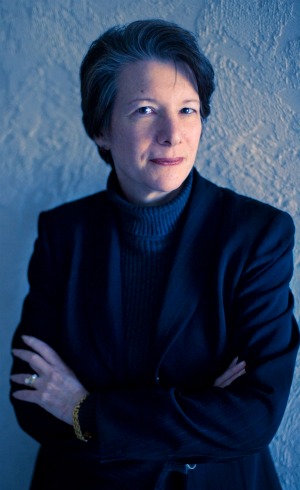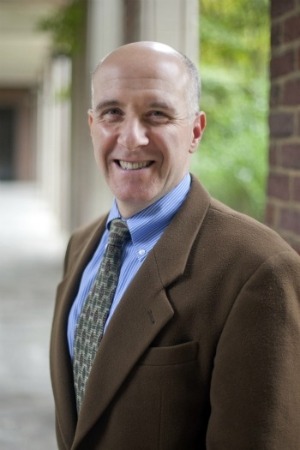
Amy-Jill Levine forgot “after about the first 12 minutes” that she was inside a prison back in 2005 when she first taught at Riverbend Maximum Security Institution. “I didn’t know what to expect, but what I found was extraordinary,” said Levine, University Professor of New Testament and Jewish Studies at Vanderbilt. “We opened up the conversation, and it was among the richest I’ve ever had.”
Of Divinity faculty, Levine has taught the most classes at Riverbend. She will return in the fall to teach “The Gospel of John” to a class limited to 12 inmates and 12 Vanderbilt students. Levine, Bruce Morrill, Daniel Joranko and Richard Goode recently discussed their life-changing experiences teaching in Nashville-area prisons during the Rethinking Prisons Conference at Vanderbilt. The panelists agreed that what sets apart the Vanderbilt classes is that university students learn alongside the “insider” students, many of whom routinely sign up for the single class taught each semester. “One of the challenges of teaching in a maximum security prison is that you have to keep developing new courses because your insider students will be in your classes for more than the three years of a normal Divinity School degree program,” Levine said.

Morrill, the Edward A. Malloy Professor of Catholic Studies at Vanderbilt, taught “Suffering, Politics and Liberation” this spring at Riverbend. “It is a course I actually developed as a doctoral student at Emory University and have taught many times with some modifications along the way,” Morrill said.
The course is described as a close reading of biographical and theological texts to explore the practical role religious faith plays in people’s experiences and responses to suffering caused by systemic injustice in societies. The readings included biographies of Rigoberta Menchu, Archbishop Oscar Romero, Martin Luther King and Malcolm X. Morrill noted that several of the inmates are very involved in chaplaincy programs and are deeply appreciative of the opportunity to enroll in the Vanderbilt classes.
After Morrill came to Vanderbilt in summer 2011, he was invited to join the Contemplative Study Group at Riverbend, which meets Saturday evenings for worship and reflection. “[rquote]I had already heard the insiders speak with such joy about the classes on Monday evenings, so I was ebullient to have the opportunity to teach there,” he said.[/rquote]
One of the early driving forces behind the Vanderbilt Divinity prison ministry was the late Harmon Wray, a Nashville criminal justice expert who died unexpectedly in 2007. Shortly before his death, Wray was quoted in a Vanderbilt Register story. “The initial idea was based on a program that’s been going on for 20 years at Sing Sing Prison in New York,” Wray said. “The difference here is that I don’t think there’s any other place in the country where divinity students are actually sitting in the classroom with the Riverbend students reading the same material, discussing the same material.”
Joranko, adjunct lecturer at Vanderbilt Divinity School, took over coordination of the program after Wray’s death. “Faculty bring their own unique teaching styles to each course, but most of the classes ‘gel’ around the content with in-depth discussion,” Joranko said. “The most important value is the community of mutual respect that helps both the Riverbend and the Vanderbilt students grow formatively through the experience.”
Also participating in the conference was Richard Goode, a professor of history at Lipscomb University. Goode earned his doctorate in religion from Vanderbilt in 1995. About five years later he began exploring with Wray and others the idea of forming a master’s of divinity program at Riverbend. When the program was launched, courses were limited to “special topics” taught by adjunct instructors.
In 2004 Goode and other prison ministry advocates met with tenured Divinity faculty to see if they would be willing to relocate some of their classes to Riverbend. Goode noted that Levine was one of the first to step up to the challenge. Goode also played an important role in developing Lipscomb’s undergraduate liberal arts education program at the Tennessee Women’s Prison. “Teaching at the prison is truly inspiring, but it’s important to consider the perspective of the insider students when teaching the material,” Goode said. “[lquote]If we walk in saying ‘we are here to save you’ or ‘we are here to fix you,’ we’re creating as much trouble as anything else. However, if we say ‘our liberation is bound together,’ then we might begin to learn together,” Goode said.[/lquote]
Most of the 15 prisoners from the first group in the Lipscomb program, which started in 2007, will earn their associate degrees in December. The Lipscomb tuition is $450 per student for a three-hour semester course and textbooks. Goode said that a small grant that runs through the end of this year covers tuition for some students. In addition, a number of donors provide scholarships for others not covered by the grant.
The insider students at Riverbend are not charged tuition. Those who have already earned a bachelor’s degree are eligible to receive credit for the master’s-level courses. At this time, insider students cannot earn a master’s degree since not all of the required courses have been offered behind the walls. That was a longtime dream of Harmon Wray that those who have taught at Riverbend hope will be realized someday.